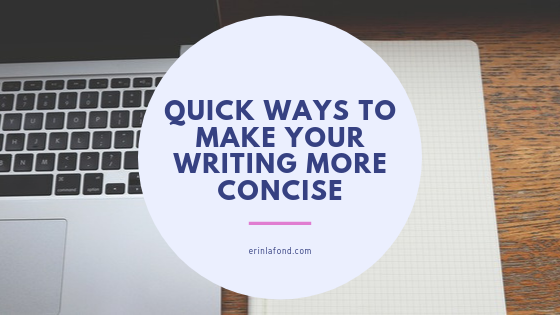Quick Ways to Make Your Writing More Concise
Last updated on July 14th, 2022 at 08:55 am
Most of my business students struggle with making their writing more concise because they’re so used to writing in an overcomplicated way. This is either because that’s what they think writing should look like or because they’re used to trying to hit a page count. Complicated and/or ornate language doesn’t automatically make the writing good. In fact, it’s generally the opposite.
Every writer can benefit from making their writing more concise. Concise writing makes it easier for your reader to follow you, and it forces you to use more effective language.
Even J.R.R. Tolkien, one of the kings of flowery language, often relied on strong verbs and nouns to get his point across quickly. This way he could use his word count on the things he actually cared about, like what Rivendell looked like and how the elves sang.
Check for repetitive language and ideas
Often I’ll read pieces with several lists that don’t need to be lists or the writer will use two words when they could use one. Something doesn’t need to be smooth and slick. It can just be smooth. You don’t need to say “intensely rigorous.” You can just say rigorous. In fact, every time you use multiple adjectives to describe something, look at each adjective individually. Do you need to say that the school’s alumni are loyal, passionate, and numerous? Can you pick one? Sometimes, the answer will be no. You want all of those descriptors. But most often the answer is going to be yes, you can get rid of some.
The same goes for any ideas you’ve already addressed. Read through each of your paragraphs and ask yourself if each paragraph addresses a new idea or at least (in longer papers with complicated ideas) a new section of the same idea.
Check for words like “very”
I’m going to be harsh with this one. Strip the word “very” from your vocabulary. This also applies to any words like “really,” “extremely,” and “greatly.” Just get rid of them. You don’t ever need them. If you ever take out the word “very” and you think your language is no longer strong enough, you need better verbs and nouns. He didn’t run very fast; he sprinted. She isn’t very sad; she’s depressed.
Write as you talk
I’m always careful with phrasing when I tell students to do this because, of course, we generally speak informally and use slang or say the word “like” frequently. But what we also usually do is say things in the clearest way possible. Up above, I almost typed “we generally speak in an informal manner,” but that was not necessary. I would never say that because it’s not the fastest way to get to my point. Basically, write as you talk and then formalize your language if need be.
Read your work out loud
This is the absolute best tip I have for when you’re writing literally anything. I have never had a student meeting during which I did not tell them to read their work out loud. Reading out loud forces your brain to recognize most mistakes whereas, if you read in your head, your brain might skip over things or fill in gaps for you. In this case, reading out loud can force you to pay close attention to how long your sentences are. Now, of course, long sentences aren’t bad, but if you find yourself going on for a while and you’re still reading the same sentence, it’s worth looking at that sentence.
Additionally, pay attention to when you say something different than what you wrote. That’s a great indication that something you wrote could be said in a clearer or simpler way.
Most writing systems also have an accessibility tool that will read your work out loud for you. This can be even more useful for editing (especially if you have a disability or even if you just don’t want to listen to the sound of your own voice). You’re more likely to hear mistakes if someone is reading it to you.


One Comment